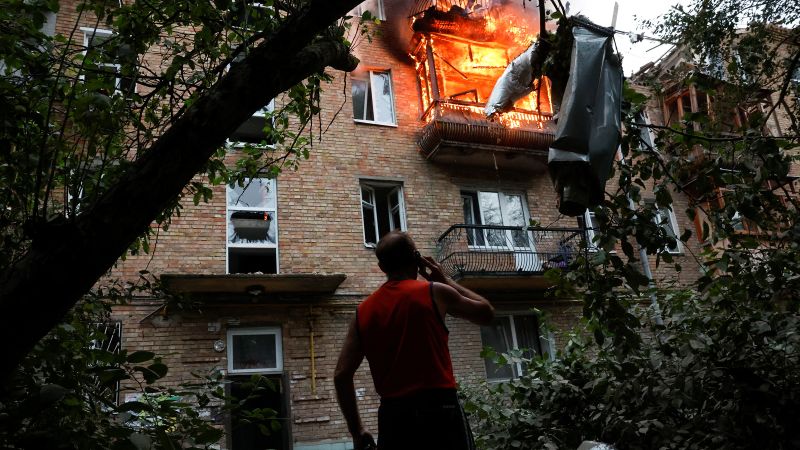Anchorage, Alaska
—
Alaska is unlikely to have been on many peoples’ bingo cards as the venue for a key summit between the leaders of the United States and Russia.
Yet America’s biggest, remotest state is where Presidents Donald Trump and Vladimir Putin are now set to meet for one of the most potentially consequential encounters of their presidencies.
That’s certainly the view from Moscow, where pro-Kremlin propagandists are already flushed with anticipation at the benefits this much-anticipated face-to-face meeting will deliver.
Or, more specifically, will deliver for Putin.
Firstly, the fact a summit with the US president is being held at all is a massive win for the Kremlin.
“No one is talking about Russia’s international isolation anymore, or about our strategic defeat,” wrote Alexander Kots, a prominent pro-Kremlin military blogger on his popular social media channel. He added that the Alaska meeting had “every chance to become historic.”
He may be right. A presidential summit allows Putin to be seen back at the top table of international diplomacy, while thumbing his nose at critics and nations who want him shunned if not arrested on charges of war crimes in Ukraine.
And a summit in the US state of Alaska, of all places, is red meat to resurgent Russian nationalists who still bluster about the territory being rightfully theirs.
Just across the Bering Strait from the Chukotka region in the Russian Far East, Alaska was once a remote possession of the Russian Empire before being sold to the United States in 1867 for what was, even then, a paltry sum of $7.2 million, about 2 cents an acre.
The idea that Moscow got a raw deal still lingers and a visit to “our Alaska,” as one prominent Russian state TV host dubbed it, bolsters Putin’s nationalist credentials. Video clips of Trump misspeaking at a White House news conference ahead of the summit, saying he was going to “Russia” to meet Putin, have also been trending on Russian social media with captions saying the US president had finally “admitted it is ours.”
For the rest of the world, though, the sole focus of this presidential summit is the war in Ukraine and whether Russia is prepared to make any concessions to end it. The White House has said Trump expects to focus squarely on ending the war in Ukraine, leaving other issues Moscow has said could be up for discussion for another time.

On Wednesday, Trump promised “very severe consequences” if Putin doesn’t agree to end his war, following a call with Ukrainian President Volodymyr Zelensky and European leaders.
But so far there’s been little sign of real compromise from the Kremlin, which regards itself as having the upper hand on the grinding Ukrainian battlefield. As recently as last month, on a phone call with Trump, Putin reportedly reiterated that Russia would “continue to pursue its goals to address the root causes” of the conflict in Ukraine – these “root causes” having previously included long-held Russian grievances that include Ukraine’s existence as a sovereign state, and NATO’s eastward expansion since the end of the Cold War.
More likely, Putin is up to something else.
Details have emerged of a Russian peace offer reportedly made to US presidential envoy, Steve Witkoff, before the Alaska summit was hastily arranged. In essence, the proposals involve Kyiv surrendering territory in the Donbas region of eastern Ukraine, in exchange for a ceasefire, an idea the Ukrainian leadership has firmly ruled out.
“I am not going to surrender my country because I have no right to do so,” said Zelensky ahead of the summit, which he was not invited to. “If we leave Donbas today, our fortifications, our terrain, the heights we control, we will clearly open a bridgehead for the preparation of a Russian offensive.”
But Trump, who is expected to discuss the idea with Putin in Alaska, appears to like the sound of a land-for-peace deal, even one so unpalatable to Ukraine and its European partners.
That clear difference of opinion represents an opportunity for Putin to portray the Ukrainians and the Europeans – not Russia – as the real obstacle to peace, potentially undermining Trump’s already shaky support for the Ukrainian war effort. Trump has lost patience with Zelensky before, the Kremlin will have noted, and may do so again. If he were to cut off the remaining US military aid and intelligence sharing with Kyiv, Ukraine would struggle to continue its fight even with bolstered European support.
Ahead of the summit, the White House appeared to downplay expectations of a peace deal, characterizing the high-stakes meeting as a “listening exercise.”
That may suit Putin just fine.

It was, after all, the Kremlin who solicited the summit, according to the White House – possibly as a way of heading off a threat of US tariffs and secondary sanctions that Trump said would kick in last week. Keeping Trump talking may be an effective way of pushing back that deadline indefinitely.
More broadly, Putin sees a unique opportunity with Trump to fundamentally reset relations with Washington, and separate Russian ties with the US from the fate of Ukraine, a scenario that would also divide the Western allies.
For months, Kremlin officials have been talking up possibilities for economic, technological and space cooperation with the US, as well as lucrative deals on infrastructure and energy in the Arctic and elsewhere.
The fact the Kremlin’s top economic envoy, Kirill Dmitriev – a key interlocutor with the Trump administration – is part of the Russian delegation to Alaska suggests that more talk of US-Russian deal-making will be on the agenda.
And, if Putin gets his way in this summit, the “Ukraine question” may find itself relegated to just one of many talking points between the powerful leaders of two great powers – and not even the most pressing one.

